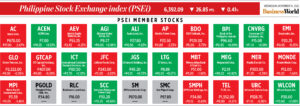Spending, remittances to fuel PHL growth, with climate seen as drag on economy

THE Philippine economy is expected to grow stronger this year on the back of household spending and remittances, but climate-related disasters may temper any momentum, the Organisation for Economic Co-operation and Development (OECD) said.
In an economic outlook, the OECD said an export boom in information technology-business process outsourcing (IT-BPO) and a recovery in tourism will also be major growth drivers.
“In 2024, the (Philippines) will continue its rapid economic recovery, driven by a robust household consumption, and an improved global growth outlook,” according to the report.
“Other key drivers supporting economic growth momentum in the near term include sustained remittance inflows, fast-growing exports in the IT-BPO sector and steady expansion of the tourism sector.”
The OECD noted that Emerging Asia economies, including the Association of Southeast Asian Nations (ASEAN) countries and China and India, will be resilient throughout the year. However, growth risks include external headwinds, extreme weather, and elevated levels of debt.
“Economic growth in the region this year will be driven by robust domestic and regional demand and a continued recovery of the service sector, particularly tourism. However, the region still faces challenges such as weak external demand,” the OECD said.
Continued recovery in the region’s manufacturing activity is also expected to benefit high-technology exporters in ASEAN amid higher-for-longer interest rates, OECD said.
“The anticipated end of monetary tightening by OECD economies in the second half of the year should help boost investments adding fuel to a global trade rebound.”
Potential rate cuts could also boost high-tech automotive sectors and digital services in the Philippines, Thailand, Indonesia, Malaysia, and Singapore.
Improved factory activity would also mean more foreign direct investment especially in ASEAN’s semiconductor and automotive manufacturing industries, the report said.
“ASEAN’s role as a manufacturing hub is expected to strengthen over the medium and long term as it continues to attract global investment despite reshoring trends elsewhere,” OECD said.
However, recovery in merchandise trade remains weak in the Philippines, Malaysia, Indonesia, and Thailand, it said.
Emerging Asia should remain wary of climate disasters, which are expected to “hinder sustainable development.”
The report emphasized the need to bolster institutional capacity, increase funding, and expand disaster risk financing options.
Governments should also push for disaster risk education, a responsive health system, private sector involvement, and more resilient infrastructure.
Climate change could weigh on the Philippines’ growth potential, the OECD said, leading to “significant social, economic, and environmental costs.”
“Both exposure and vulnerability are being exacerbated by an increasing number of urban poor communities in hazard-prone areas, linked to rapid and unplanned urbanization,” the OECD said. — Beatriz Marie D. Cruz




